I have had so many questions and requests for this topic from readers and social media followers that finally it was time to sit down and write everything out. I have three children, my two oldest children were born in the United States, with the care of midwives at their delivery. My youngest I was pregnant and delivered while living in Morocco under the care of a midwife and obstetrician. This information is based on my experience and research. It is not medical advice nor is it meant to be a representation of everyone’s experience.
Table of Contents
My Personal Story and Background on Pregnancy and Childbirth in Morocco
I was very nervous about getting pregnant and having a baby in Morocco however I also knew financially it wouldn’t have been a reality to have another child in the US. After learning we were pregnant I immediately began to get worried and ask every question to myself possible. I was a complete mess of nerves.
My biggest issues were;
a) Morocco has a HIGH rate of c-sections. I had two completely normal deliveries in the US and really did not want to be pushed into a c-section.
b) I also had heard that in many cases fathers were not allowed in the delivery room. This was a complete impossibility for me, especially because language was some concern. I didn’t want to be in a position trying to deliver a baby, without my husband and an inability to communicate clearly what was wrong.
Living in Marrakech we had many more options than if we lived in a smaller city. This is a huge benefit to giving birth in a bigger city. The doctors in larger cities also tend to have more experience with international medical practices. Having previously had two children I did have an idea of what to ask and what to expect. This let me seek out a doctor that would be a good fit.
It is completely normal in Morocco to visit multiple doctors to find one that you like. If it’s your first pregnancy then spend time ahead researching to see what you really want. To be honest the doctor I settled on asked me more questions and took me more seriously than the midwives and doctors I had encountered with either pregnancy in the US and I didn’t dislike my US experience.
There are two main situations to give birth there are both public and private hospitals. Public hospitals are dismal at best. If you can avoid delivering in a public hospital I would advise it. For anyone used to western medical standards and practices a public hospital is going to be a complete shock. Multiple women in labor at the same time in the same room, no privacy and VERY basic facilities.
Private clinics can be basic or they can be incredibly modern – this is why it’s important to do some research ahead of time. You also need to check that your doctor delivers at the clinics you choose. (Note clinic is interchangeable for hospital in the west). If you find a doctor you like, visit all the clinics where they deliver so that you can decide. You may have to change doctors or hospitals depending on this.
When touring the hospital I was a little disappointed to find that there were no bathtubs in any of the rooms. When I was in labor with my older children I found a lot of relief soaking in a warm bath, this is not really a thing in Morocco. But it wasn’t a game changer and ultimately everything else was fine.
I have never delivered with a doctor, I only had midwives for my older children, though I did deliver in a hospital both times. I didn’t know what to expect but in Morocco you must have a doctor even if you plan to use a midwife. One of the reasons I selected my doctor was because he was completely open to and had done many deliveries in conjunction with a midwife. The lead midwife at the clinic where I delivered was French but also spoke English (my doctor also spoke English). I can’t stress how much more at ease this put me. Yes, I could have gotten by with just Arabic but in the moment of having a child the last thing I wanted to be stressed about was a language miscommunication.
In the end I had to have a c-section as my baby was transverse (sideways) and I had gone into the early stages of labor. The doctor and midwife both knew he was in this position and we had worked for about two weeks to try and get him to turn naturally but were unsuccessful. My doctor knew how much I wanted a natural birth and tried to do everything he could to make sure that happened – but in the end it wasn’t meant to be. I’ll discuss the process in a later section.
Now let’s get down to some of the details.
Handling Pregnancy in Morocco
Pregnancy is really celebrated and an important time in the couple – and the mother’s life. Honestly, expect to be quite spoiled. Anything and everything you might want to eat or have will be brought to you if you have family nearby. There’s even a belief if a mother isn’t given the food that she craves the baby will have a birthmark in the shape of that food.
As lovely as this is you can also expect quite a bit of advice whether solicited or unsolicited. People will comment on what you eat, or what you don’t eat. They’ll comment on whether you’re dressed warm enough. If you’re doing too much. What is wrong if you’re not feeling well. What you should eat/drink if you don’t feel well. It can be a bit overwhelming.
Some of the more interesting aspects of being pregnant in Morocco was the beliefs (old wives tales really) about the meanings of different things. For example if you have heartburn they say the baby will have lots of hair.
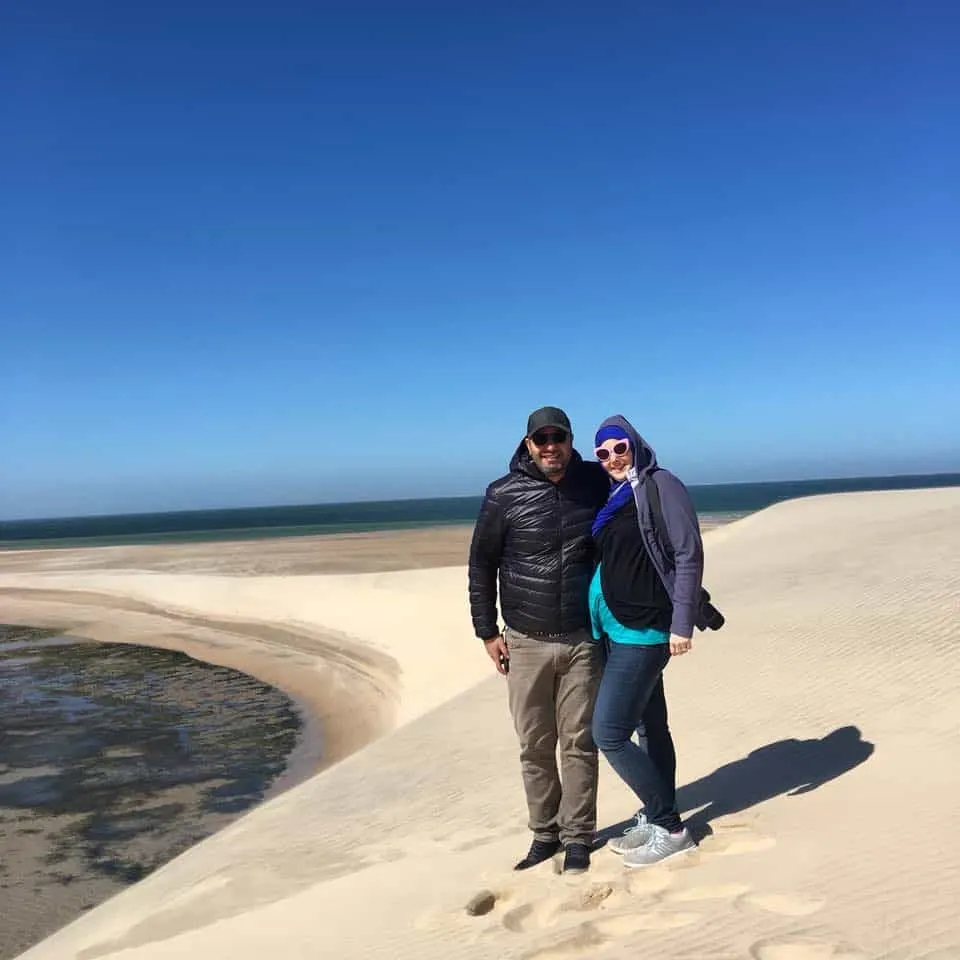
Overall my pregnancy was easy. I worked and I traveled until I was no longer allowed to fly. I think many of my Moroccan in-laws thought I was absolutely crazy and I know when I told my doctor that we were going on a ski holiday in Austria when I was 5 months pregnant his eyes doubled in size. Remaining active and participating in life really helped me and is completely possible here.
The hardest parts were; having cravings for things I couldn’t make or couldn’t get (Kraft Macaroni and Cheese I’m looking at you), dealing with comments on my lack of weight gain/lack of appetite, and chronic headaches that I dealt with. If I were pregnant during the summer, that would have also been an issue. If this is you, you’ll want to make sure you’ve got air conditioning options!
Prenatal Care in Morocco
Prenatal care is not standard or created equal. As I mentioned above you need to do your research and find a doctor that fits your wants and needs. Ask a lot of questions and don’t be afraid to be specific.
If you are in an urban setting you’re going to have a lot more options than someone in a rural setting. I know many women that drive to the closest large city for their prenatal care and then take an apartment in the last month or 3 weeks of their pregnancy to be closer to the hospital. Rural care is not only lacking but may not be able to assist you quick enough if something goes wrong. Home births used to be really common in Morocco but they are no longer (again in a rural setting they do still happen out of necessity often vs. desire). If you are interested in having a home birth you will need to do due diligence to find someone that can assist and also know the procedure for registering the child’s birth afterwards.
Every doctor has a different rhythm but I found that throughout my pregnancy it was normal to visit the doctor every 15 days (in the US it’s usually every month and then in the last 2 months maybe every two weeks, and weekly at the very end).
An appointment usually consisted of arriving with my dossier (folder with my ultrasounds and info), being weighed by the doctor’s assistants, waiting for my turn, having an ultrasound to check on the baby, and then speaking with the doctor about any issues I was having or questions I had. He would order any blood tests that were required.
One big difference between the US and Morocco was that I never had a physical, internal exam ever from the doctor. The only time was when my midwife checked because I was having labor symptoms and yes I was in labor.
Most all of the blood tests done were similar to the ones that I had in the US. The first test is a large panel of tests that’s mostly a baseline of your levels. It’s a bit pricey – around 1000 dirham. Towards the 5 month mark there was a glucose screening. The doctor will either order the 1 hour test or the 3 hour test (you want the 1 hour if possible). This test was about 300 dirham.
All blood draws are typically done at a laboratory, of which there are many. You can choose which one you’d like to go to and if money is a concern you can call and ask the price upfront. You then go with the orders from the doctor, they do the blood draw and you return when they tell you to pick up the results that are brought back to the doctor.
One other thing to note, if you’ve never been to a doctor in Morocco, be prepared to wait. While you may have an appointment “time” it’s really not going to happen at that time. You will arrive, and you will wait. Sometimes you will wait a few hours. I read a lot of books in the waiting room and yes it is extremely frustrating.
How to Find a Doctor and Clinic
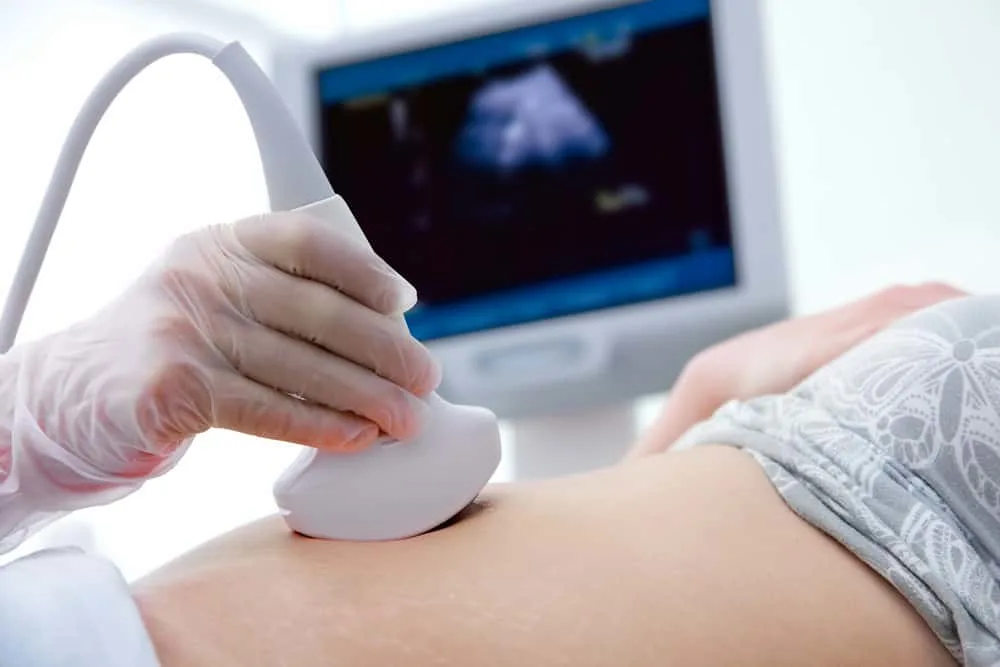
I’ve talked a lot about finding the right fit but how do you begin looking?
One of the best ways is word of mouth. Morocco still is very much a word of mouth society so ask around. Also join any local expat groups online. This can offer a wealth of information especially from non-Moroccans who have different life experiences. What I’ve found is that my family (sister in laws etc) have very different expectations of what they consider good/bad than what I would as an outsider. So while their advice can be helpful it also isn’t always the best for me.
When you visit the doctor, you can ask for a consultation to just get to know them and ask some questions. Some important things to consider asking are;
- Where did you do your training and how long have you been practicing (and where)?
- Which clinics are you affiliated with?
- What are your beliefs on natural birth vs c-sections? If it is very important to you to have a natural birth you want to make this clear. Most doctors won’t say they prefer a c-section so you’ll want to gauge how they answer and any follow up informaiton they offer. If they say “ok’ and leave it at that I might be a little hesitant.
- What is the procedure if I go into labor and you’re out of town or unavailable?
- Do you work with a midwife?
- How do you feel about prescribing or working in tandem with alternative care providers like chiropractors, massage therapy etc.?
- Will you permit my spouse to be in the delivery room?
- Any other information that is particularly relevant to your situation should also be asked.
If you decide that you do like the doctor than it’s time to visit the clinics they are affiliated with. Conversely, you can choose a clinic and get a list of OB doctors that deliver there and find the right doctor for you that way. Some questions I would ask at the clinic include;
- What is your policy on having a spouse in the delivery room?
- What types of rooms do you have? Shared only? Private rooms? If private can my husband or family member stay with me after the baby is born?
- What do you provide in the rooms and what do I need to bring myself?
- What are the staff credentials? Nursing staff? Are midwives available?
- Is there neonatal or specialty care available if needed? What is the procedure if not?
- Will I be able to keep the baby in the room with me at all times? Or, are there procedures for newborn care as well?
- What are the languages of the staff? (In my case the nursing staff didn’t speak English but in the surgical ward they did).
- What is the overall attitude towards c-sections?
- Assess the cleanliness of the facility
- Do they have air conditioning and can you adjust the temperature. This sounds trivial. Giving birth in Marrakech in summer with no air conditioning was a no-go for me. You’ll want to know!
- What are the breakdown of costs and how is payment made. This is important as in some cases you will need to pay the entire bill in full before you can be discharged.
Preparing for the Hospital and Delivery
As the pregnancy nears an end you’ll be getting ready for the delivery. Because I previously had children I really didn’t do any labor classes, but they were available if I wanted them via my midwife. If you’re a first time parent, this might be something you’ll want to ask about.
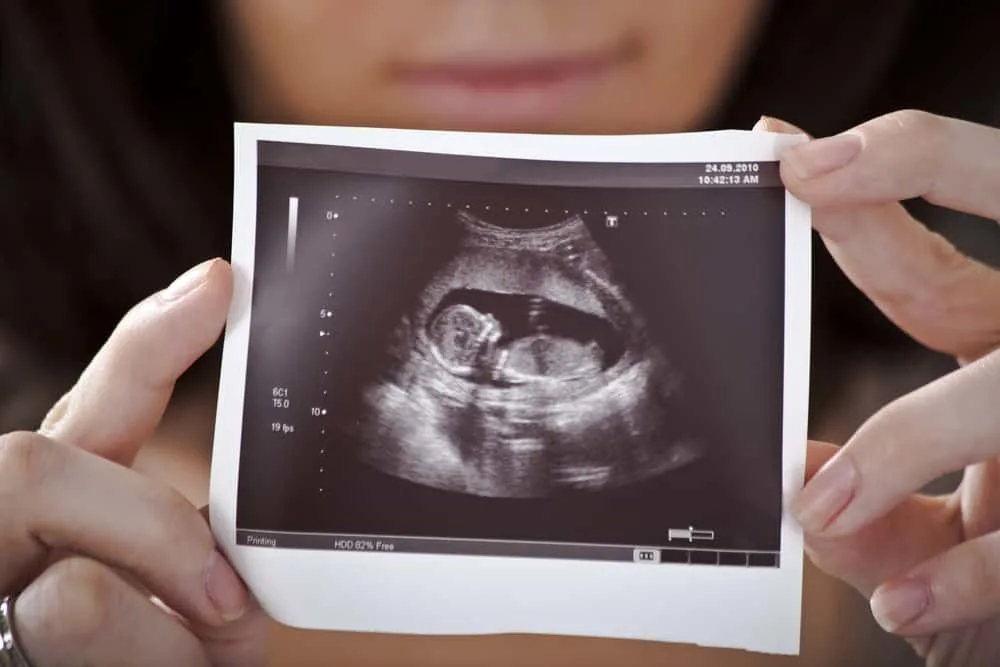
In the US there was also a near obsession with crafting the perfect birth plan. Guess what – it really doesn’t exist in Morocco. Mention a birth plan and you’ll likely get a blank stare. It’s great to have an idea of what you’d like your birth to look like but don’t get your hopes up too high and risk being crushed when that expectation isn’t met. Be very realistic about what is and isn’t available and be ready to adjust your expectations on a dime. In the end my “birth plan” was to have a healthy baby. Some of the process went as I had hoped and other parts had to be adjusted.
It’s important to note that if you have to have a c-section more than likely your husband will NOT be allowed in the operating room. I went from being examined to being on an operating table in about 10 minutes. I was not prepared and all I can say now is it was pure adrenaline fueling me. I did get to see my husband before I went in but it was very fast and we hadn’t prepared for this possibility at all. I was incredibly thankful that I spoke enough Arabic to have enough conversation to relax. Also the assistant anesthetist stayed with me, at my head the entire time and she spoke great English.
My doctor also stepped up in a big way. He knew my fears, he knew I didn’t want a c-section, and he also knew how much I wanted my husband there with me. Before the procedure he stopped, and stood at my head and talked to me for awhile to calm me down (I’m sure my heart was pounding out of my chest). He talked me through every step of the procedure being both doctor and comforter. It was truly more than I could have asked for.
After the baby was delivered I only was able to see him for a brief minute and then the midwife took him to clean him up and get him to my husband. She knew that I favored a more hands off approach and completely respected my wishes. The hardest part was that after a c-section you have to lie in the recovery room flat for about an hour. This is so that you don’t risk complications from the spinal block and to allow feeling to return to your lower body.
During this time my husband had the baby (not an issue because he knew what to do!) but the nurses were pushing him to give the baby a bottle because “he was hungry.” My husband knew I did not want the baby given formula and kept putting them off until finally they said he had to. He further delayed them by telling them he would go to the pharmacy to buy a new bottle instead of using one they had available. By the time he returned from the pharmacy I was back in the room and was able to breastfeed the baby. Because my husband and I had talked and were on the same page with our wishes he was able to advocate for me.
I can’t stress enough how important it will be for you to have an advocate to back you up. Your husband, your in-laws, friends – any and everyone that can be on your side to make sure your wishes are met.
Packing your hospital bag
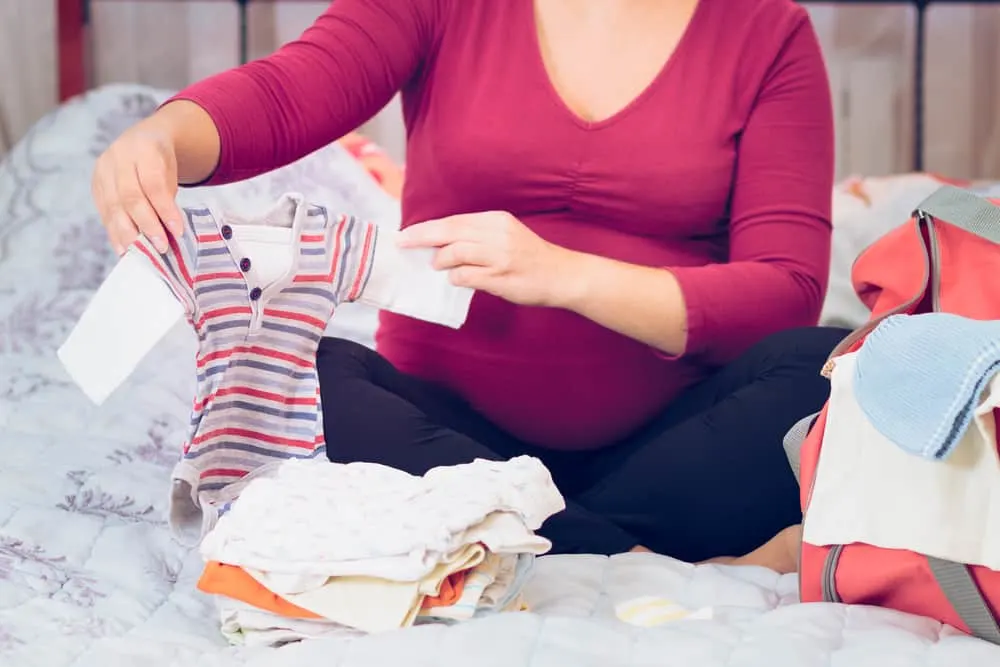
This is a major difference with delivering in Morocco vs. the US and I was not prepared at all. When we went to the hospital for a check I didn’t think I’d be delivering at that moment and didn’t even have a bag ready at home because it was over 3 weeks from my due date. In the US most everything you need aside from comfort items and things for baby is provided. Not the case in Morocco even at a really nice clinic.
Here’s what you need to bring – everything.
- Any and all toiletries you will want including hand soap and a towel
- Underwear for after you deliver
- Heavy duty pads for after delivery
- Clothing to wear immediately after delivery – nursing friendly if you plan to nurse
- A robe
- Sandals or slippers to wear in the room
- Multiple pieces of baby clothes
- Diapers and wipes for baby
- Blankets for you and baby, pillow for you
- Water and/or food and snacks
- Phone Charger/books/ anything you might want in the room
If you’ve had a baby in the US then you know most of the things in that list are provided. I didn’t realize none of it would be and we were scrambling to figure out what I would need. As soon as you deliver you will be changed into your regular clothing and out of the hospital gown so be prepared. None of the items on this list were provided – except for sheets and a sad pillow on the bed.
After You Deliver What to Expect
I can’t entirely say what happens after a vaginal delivery because I had a c-section. But having had two deliveries that way I can say the recovery is going to be a lot easier than with a c-section. The biggest difference and challenge was the lack of pain medication post delivery. It is entirely on you to keep the nurses informed when you need medication and ask for it. Do not wait until the pain gets unbearable. Also don’t be surprised if the pain medication is very limited. I was somewhat shocked that after having a major surgery such as a c-section paracetamol (tylenol) was the main pain relief. I had to really push for anything stronger and feel absolutely ok with that!
My in-laws know that I am a very private person and having a lot of people around me was not what I wanted. They were all very respectful and only came to visit for short periods of time which I appreciated and looked forward to. But, this was all made clear ahead of time and my husband felt the same way. This is a conversation you need to have before delivering, and it needs to be clear how serious you are.
I have heard of other cases where the mother is expected to have lots of visitors, have food available for them etc. This would have never happened with me. While yes there may be some degree of cultural expectation it doesn’t mean you have to agree and go along with all of it. Set your boundaries and don’t feel bad about it.
My friends that visited always texted me ahead of time and usually brought ME food which was always very welcome!
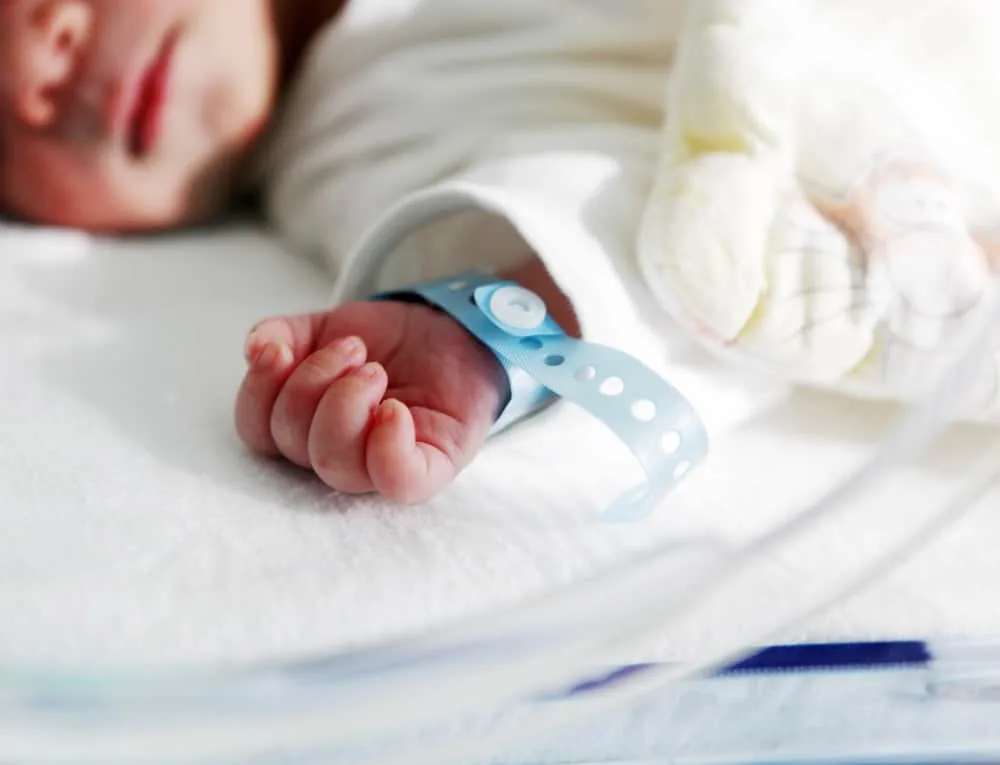
Regarding the baby, a major difference was that no vaccinations or circumcision happens at the hospital post birth. Approximately one week after the baby was born we visited the pediatrician (who also visited us in the hospital) and the baby was given the BCG vaccine. This vaccine is against tuberculosis and is required within 15 days of birth to get the babies birth certificate issued. I do know some parents that have pushed back and gotten an exemption for this vaccine but in 99% of cases the baby does need to get it.
The circumcision can happen when you’d like but is a return visit. Typically Moroccan families plan this around a celebration and it can happen at any point.
The discharge process from the hospital is straight-forward. Once the doctor clears you to leave, the bill should be settled and then you can go. Car seats are not required in the city in Morocco and you can literally drive home with the baby in your arms. (Not advocating this, just stating it’s the reality). The doctor will also send you home with a list of any medications you need to take and instructions for the next days. This is a bit more if you’ve had a c-section. Make sure to ask questions and understand everything they are prescribing.
One of the things I received was a prescription for injectable blood thinners. This was a shock to me as no one mentioned it or showed me how to use them. I also have a huge fear of needles and nearly had a panic attack when my husband brought it home. The reason I was given for this was that many Moroccan mothers don’t do a lot of movement after having the baby and risk getting blood clots. I knew this wouldn’t be the case for me and decided not to use them (after consulting the doctor). This is why I say make sure you know what you’re getting and discuss them all.
Cultural practices and beliefs around childbirth/newborns
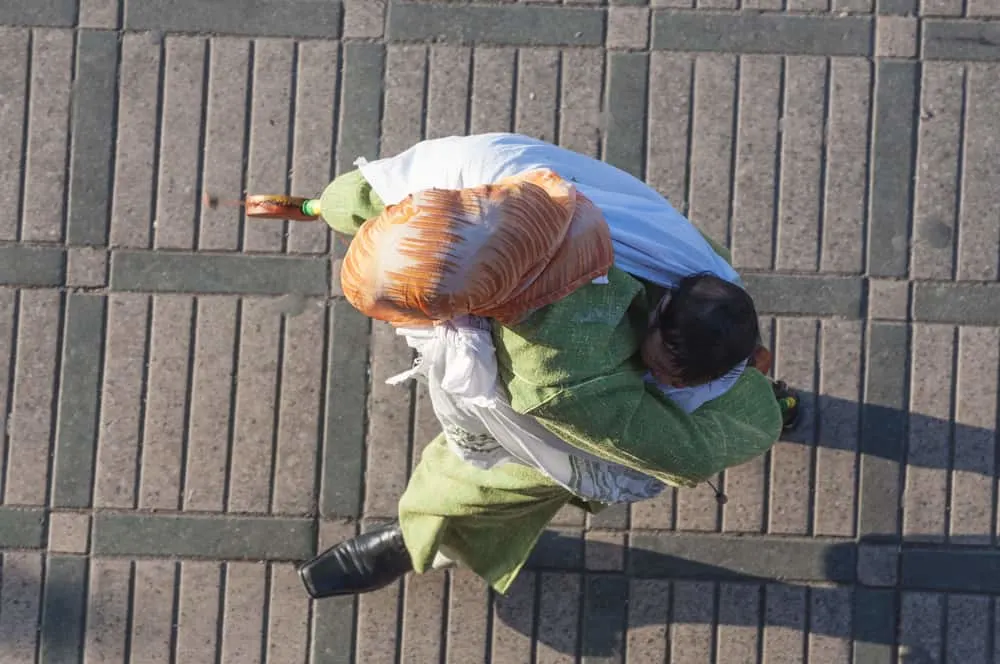
This was the hardest part of the entire pregnancy for me. You will get a lot of unsolicited advice not only from family but even strangers on the street. There also are a lot of beliefs and practices around newborns that stem from tradition and can be harmful. There are other beliefs that while different from yours are not dangerous. It will be really important for you to manage where you put your foot down and where you nod your head and move along. If you constantly put your foot down, you will go crazy. I promise.
Some people have VERY superstitious beliefs around new babies. This really did make me crazy and break down in tears more than once. There is a general hysteria around cold air (or even moving air) and babies. When I was sleeping in the living room with the baby and the air conditioner it was seen as absolute insanity. They still are puzzled why the baby didn’t get deadly sick from the cold air.
On the flip side there’s also over reaction around sun exposure; this has continued now that the baby is over a year old. When I tried to explain that sunlight was good for babies, especially if they have some jaundice it was again met with blank stares. The same can be said for baths. My baby was born in summer and anytime I brought up bathing him it was not taken well.
There are also more dangerous practices like very tight binding of babies, “stretching” of limbs and giving them foods/drinks too early. This is where I put my foot down.
One of the biggest challenges was the fear of the evil eye. As a part of traditional healing from childbirth it’s normal for Moroccan women to spend a long period of time post delivery at home being waited on – up to 40 days in some cases. They spend the time with the baby and little exposure to outsiders. This tradition is dying off but does still happen and I believe is due in part to this belief. People are very fearful that someone will see their new baby and give it “the evil eye” essentially their jealousy of your baby will put a curse on the baby. I personally do not believe in this and found that it can be taken to extremes.
Blending new motherhood with a set of completely different cultural beliefs that can at times be very overbearing, old fashioned, and oppressive and coupled with potential post-partum depression can lead to a firestorm of issues. Don’t make the mistake I did – GET OUT OF THE HOUSE! Seriously, you need to get out of the house with your baby as soon and as often as possible. This is good for both of you and can help stave off a lot of the issues.
The longer you stay inside the more intense the feelings will get. At times felt like I was in prison. Also, speak with your doctor. If they don’t take you seriously find a psychologist to get help, especially if you have postpartum depression. Not sure if you do? Read this post from Mayo Clinic to help identify the symptoms.
As much as you may have to deal with the issues above, you also will experience another side of this. New moms in Morocco are really well cared for – if you have an extended family nearby. Special foods are prepared for the mom and usually the rest of your family (husband/children) are also fed and cared for by family members.
Some of the special foods made for new moms include;
- Louiza (verbena) tea – this was the first thing given to me after delivery – before water!
- White harira (semolina) with milk
- Barley harira that looks a bit like oatmeal
- R’fissa
- Beldi (country) rooster cooked with onions and sauce
There are also a lot of traditions around healing the mother after giving birth. My in-laws asked if I wanted this and I told them no thank you. While it would have been interesting to experience, at the time I was not in a place to accept this lovingly and really the healing I needed most was rest. If you’re interested in learning more about this I highly recommend you check out Leyla’s website where she talks about the rituals such as closing the bones.
Where to Buy Maternity and Baby Clothes/Items in Morocco

Some of the practical bits. In general the things that I wanted or needed could be found in Morocco but were MUCH more expensive or were not great quality. We ended up getting our stroller/car seat combo, a Pack and Play, breast pump, baby carrier, and quite a few clothes from the US. You could also drive to Ceuta to get better quality items in Spain for a much lower price. If this isn’t an option, there are some places you can look for baby things in Morocco.
- Orchestra – this is a store that is found throughout Europe and also in Morocco. They are in most major cities and have a wide variety of clothing and baby products (car seats/high chairs etc). This was also the only place I found newborn sized diapers. They have a yearly membership fee that lets you buy items at a big discount. It was worth the price of membership for the savings. That being said, when I went to Ceuta (there’s also an Orchestra there) the prices were MUCH cheaper than in Morocco.
- Kiabi – A clothing store that carries maternity and newborn/children’s clothing. Note not all stores do so you will want to check if your local store does.
- LC Waikiki – Another clothing store with options for maternity and newborns.
- Parapharmacies – These are different than a traditional pharmacy and often carry specialty goods like baby products (think bottles, teethers, pacifiers etc).
- Pharmacies – This is where you go to get formula if you’re not breastfeeding as well as any medications either prescription or able to be asked for over the counter.
- The souk – The quality may not be as good but you can find some decent options for things like onesies and blankets.
- Marketplace Online – In many of the groups for expats online (especially in Facebook) it’s common to see moms selling items they no longer need. You can find good quality, gently used items many of which were purchased abroad.
- Carrefour/Marjane – These are grocery stores but it’s where we get things like diapers and wipes.
Pregnancy and Birth Cost Breakdown
This is a very rough estimate based on my own experience in Marrakech. These costs are out of pocket with no additional health insurance coverage.
- Prenatal checkups – 200-300 dirham per visit at roughly 12-15 visits. Cost includes any ultrasounds needed.
- Beginning blood panel – 1000 – 1200 dirham
- Glucose screening – 300 dirham
- Hospital stay c-section delivery – 11,000 dirham all inclusive
- Hospital stay vaginal delivery – 5,000-6,000 dirham
I hope that this has helped to explain and give some insight into the entire process from the point of view of someone who had no experience in this area. Again, this was my experience and notes only and is in no way meant as the only way or the only experience. Overall I was very happy with everything and while there were and continue to be challenges I am glad I chose to stay in Morocco to deliver.
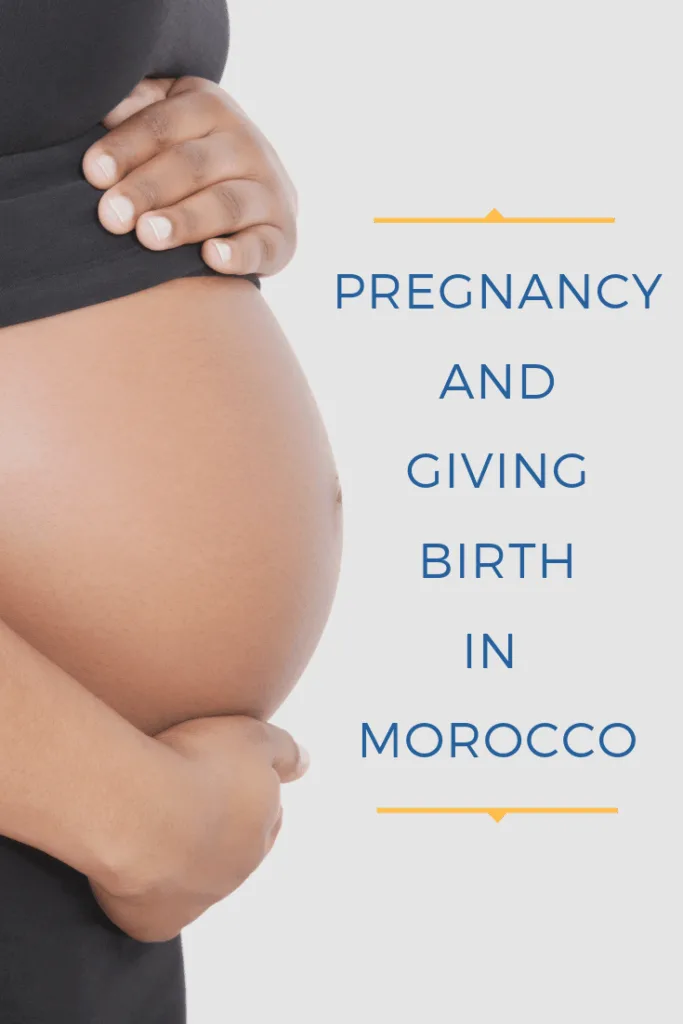
Special thanks to my mom who insisted while I was recovering in bed I write as many notes as I could think of because “you’ll want them one day!”